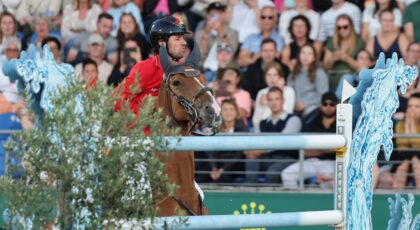On Thursday last week, the usually placid surface of summertime Lake Michigan, gurgled and rose with life. Big waves wrestled awake by the storm the night before.
The other swimmers gleefully climbed down the rocks for the perfect spot to get in and out. The goal is to find a stone that is both slightly sheltered from the surf, with as little algae as possible, but with enough room to grip that you could pull yourself up. The swimming itself is not the most dangerous part, the swimmers told me, it’s the getting in and out.
Watching them, I clutched the gear bag on my shoulder and waffled. Yes? No? Get in? Do not get in?
I have been a swimmer since high school, always strong, but never fast. My swimming buddy, a painter and writer who had been open water swimming in this Great Lake for many years, introduced me to the sport, and in the summer of 2020, these swims and horses are the two things that have kept me sane as the chaos of the news rages beyond them. That day though, the water intimidated me.
I was nervous even though I am a lover of waves. In the springtime, strangers have found me cackling idiotically on the beach as I stick my ankles in the first day the water reaches 50 degrees—usually late April/early May. I sneak out to bodysurf often until October. In November, the month for shipwrecks, when the gales are the biggest, I will wander in the cold to watch them.
But Thursday was different. I had never swum in waves in deep water before.
One by one, the swimmers with their neon-colored buoys belted to their waists got in. My shorts and a t-shirt still over my swimsuit, I waited. As the plunking bodies entering the water hit my ears, my heart called out to join them with an alarming intensity.
I stripped down to my suit and pulled off my facemask. “Screw it,” I said, and I reached for my goggles and fins, strapped on my buoy, and plunged in after them.
Open water swimming is eerily like riding horses. Both require respect and skill. Their moods change with the wind and the weather.
The more skilled the rider or swimmer, the better they are at reading the conditions in front of them. They watch for signs from the bodies of the horse or water, they consider what is ahead of them and they decide accordingly.
The lake and horses always have a level of risk. The art of it is deciding when to push it and when to leave it be.
Sometimes we make the wrong choices. Sometimes we make good choices, and bad things still happen. Sometimes we make bad ones, and some lucky thing keeps us safe. Other times though, we take just the right amount of risk, and we are rewarded for our bravery.
Both riding and open water swimming are also safer, and the athlete progress faster, if they have an instructor. Just as I am grateful for every trainer I have ever had, I was also thankful for the gaggle of swimmers around me who knew the water much better than I did.
Once I was in, the waves rose and fell like tiny dark mountains. I swam up and through until the bottom dropped out the other side.
“This is the stupidest thing I have ever done,” half of my brain screamed. “This is the best thing I have ever done,” whispered the other.
Even over the din of it all, I thought about horses. I thought of how the curl of the wave has the same shape and back-ended power of a good canter. The rise and fall of them both made me finally understand why Neptune was the god of both horses and the sea.
A memory of my brother’s first canter floated in my head. The two of us and another friend had just finished up a day of farm work at a big Colorado guest ranch where I once spent my weekends. The owner handed us three horses and sent us out to ride by ourselves as a reward. Out we went, foolhardy in only the way teenagers can be.
Once we hit a big open meadow, the friend and I clucked our horses forward, propelling them into a big flying canter up a hill. My brother, behind us, yelled over the sound of his big gelding’s hooves.
“I DON’T KNOW WHAT I AM DOING!”
We pulled our horses up, and my brother came up from behind. He was pissed but grinning.
After swimming, I texted him the memory, my fingers still shaking from the thrill of the waves. Now that we are older, my brother is more of a daredevil than me. He propels out of helicopters, he fights wildfires, he goes on 100-mile bike rides. Once he won a marathon and then spent the afternoon hauling hay for my grandmother’s horses. Like a good brother, though, he was impressed by my adventure.
“Sounds like a metaphor for life,” he texted back. “Swimming in big waves saying, ‘I don’t know what I am doing,’ but you have an excellent time freaking out anyway.”


 July 24, 2020
July 24, 2020 

























